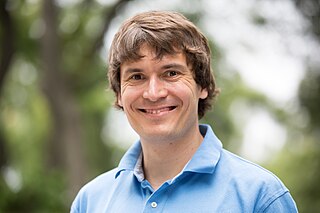
Cultural anthropology is a branch of anthropology focused on the study of cultural variation among humans. It is in contrast to social anthropology, which perceives cultural variation as a subset of a posited anthropological constant. The term sociocultural anthropology includes both cultural and social anthropology traditions.
A signature is a handwritten depiction of someone's name, nickname, or even a simple "X" or other mark that a person writes on documents as a proof of identity and intent. The writer of a signature is a signatory or signer. Similar to a handwritten signature, a signature work describes the work as readily identifying its creator. A signature may be confused with an autograph, which is chiefly an artistic signature. This can lead to confusion when people have both an autograph and signature and as such some people in the public eye keep their signatures private whilst fully publishing their autograph.

Ethnography is a branch of anthropology and the systematic study of individual cultures. Ethnography explores cultural phenomena from the point of view of the subject of the study. Ethnography is also a type of social research that involves examining the behavior of the participants in a given social situation and understanding the group members' own interpretation of such behavior.
The science wars were a series of scholarly and public discussions in the 1990s over the social place of science in making authoritative claims about the world. Encyclopedia.com, citing the Encyclopedia of Science and Religion, describes the science wars as the

Autoethnography is a form of ethnographic research in which a researcher connects personal experiences to wider cultural, political, and social meanings and understandings. It is considered a form of qualitative and/or arts-based research.

John Michael Bailey is an American psychologist, behavioral geneticist, and professor at Northwestern University best known for his work on the etiology of sexual orientation and paraphilia. He maintains that male sexual orientation is most likely established in utero.
Critical ethnography applies a critical theory based approach to ethnography. It focuses on the implicit values expressed within ethnographic studies and, therefore, on the unacknowledged biases that may result from such implicit values. It has been called critical theory in practice. In the spirit of critical theory, this approach seeks to determine symbolic mechanisms, to extract ideology from action, and to understand the cognition and behaviour of research subjects within historical, cultural, and social frameworks.

Talal Asad is a Saudi-born cultural anthropologist who is currently Distinguished Professor Emeritus of Anthropology and Middle Eastern Studies at the Graduate Center of the City University of New York. His prolific body of work mainly focuses on religiosity, Middle Eastern studies, postcolonialism, and notions of power, law and discipline. He is also known for his writing calling for an anthropology of secularism. His work has had a significant influence beyond his home discipline of anthropology. As Donovan Schaefer writes:
The gravitational field of Asad’s influence has emanated far from his home discipline and reshaped the landscape of other humanistic disciplines around him.
Trial advocacy is the branch of knowledge concerned with making attorneys and other advocates more effective in trial proceedings. Trial advocacy is an essential trade skill for litigators and is taught in law schools and continuing legal education programs. It may also be taught in primary, secondary, and undergraduate schools, usually as a mock trial elective.
Institutional ethnography (IE) is an alternative approach of studying and understanding the social. IE has been described as an alternative philosophical paradigm, sociology, or (qualitative) research method. IE explores the social relations that structure people's everyday lives, specifically by looking at the ways that people interact with one another in the context of social institutions and understanding how those interactions are institutionalized. IE is best understood as an ethnography of interactions which have been institutionalized, rather than an ethnography of specific companies, organizations or employment sectors, which would be considered industrial sociology or the sociology of work. For the institutional ethnographer, ordinary daily activity becomes the site for an investigation of social organization. IE was first developed by Dorothy E. Smith as a Marxist feminist sociology "for women, for people"; and is now used by researchers in social sciences, education, nursing, human services and policy research as a method for mapping the translocal relations that coordinate people's activities within institutions.
Campbell's law is an adage developed by Donald T. Campbell, a psychologist and social scientist who often wrote about research methodology, which states:
The more any quantitative social indicator is used for social decision-making, the more subject it will be to corruption pressures and the more apt it will be to distort and corrupt the social processes it is intended to monitor.
Harold Lloyd "Bud" Goodall Jr. was an American scholar of human communication and a writer of narrative ethnography. He was a professor in the Hugh Downs School of Human Communication at Arizona State University.

Kristen Rogheh Ghodsee is an American ethnographer and Professor of Russian and East European Studies at the University of Pennsylvania. She is primarily known for her ethnographic work on post-Communist Bulgaria as well as being a contributor to the field of postsocialist gender studies. She was critical of the role of Western feminist nongovernmental organizations doing work among East European women in the 1990s. She has also examined the shifting gender relations of Muslim minorities after Communist rule, the intersections of Islamic beliefs and practices with the ideological remains of Marxism–Leninism, communist nostalgia, the legacies of Marxist feminism, and the intellectual history of utopianism.

Brian Vincent Street was a British academic and anthropologist, who was professor of language education at King's College London and visiting professor at the Graduate School of Education in University of Pennsylvania. During his career, he mainly worked on literacy in both theoretical and applied perspectives, and is perhaps best known for his book Literacy in Theory and Practice (1984).

Dariusz Jemielniak is a professor of management at Kozminski University, faculty associate at the Berkman Klein Center for Internet & Society at Harvard University, and vice-president of Polish Academy of Sciences.

A critical theory is any approach to humanities and social philosophy that focuses on society and culture to attempt to reveal, critique, and challenge power structures. With roots in sociology and literary criticism, it argues that social problems stem more from social structures and cultural assumptions than from individuals. Some hold it to be an ideology, others argue that ideology is the principal obstacle to human liberation. Critical theory finds applications in various fields of study, including psychoanalysis, film theory, literary theory, cultural studies, history, communication theory, philosophy, and feminist theory.

Social Bonding and Nurture Kinship: Compatibility between Cultural and Biological Approaches is a book on human kinship and social behavior by Maximilian Holland, published in 2012. The work synthesizes the perspectives of evolutionary biology, psychology and sociocultural anthropology towards understanding human social bonding and cooperative behavior. It presents a theoretical treatment that many consider to have resolved longstanding questions about the proper place of genetic connections in human kinship and social relations, and a synthesis that "should inspire more nuanced ventures in applying Darwinian approaches to sociocultural anthropology".
Steven Lubet is a legal scholar and author. Lubet is the Edna B. and Ednyfed H. Williams Memorial Professor of Law at Northwestern University.
Alice Goffman is an American sociologist, urban ethnographer, and author mostly known for the fierce controversy that resulted from the publication of her 2014 book On the Run: Fugitive Life in an American City. She was Assistant Professor of Sociology at the University of Wisconsin–Madison and visiting assistant professor of sociology at Pomona College. Though once considered a "star" in the field, Goffman was denied tenure at the University of Wisconsin in 2019 and left academia.
In literary criticism and cultural studies, postcritique is the attempt to find new forms of reading and interpretation that go beyond the methods of critique, critical theory, and ideological criticism. Such methods have been characterized as a "hermeneutics of suspicion" by Paul Ricœur and as a "paranoid" or suspicious style of reading by Eve Kosofsky Sedgwick. Proponents of postcritique argue that the interpretive practices associated with these ways of reading are now unlikely to yield useful or even interesting results. As Rita Felski and Elizabeth S. Anker put it in the introduction to Critique and Postcritique, "the intellectual or political payoff of interrogating, demystifying, and defamiliarizing is no longer quite so self-evident." A postcritical reading of a literary text might instead emphasize emotion or affect, or describe various other phenomenological or aesthetic dimensions of the reader's experience. At other times, it might focus on issues of reception, explore philosophical insights gleaned via the process of reading, pose formalist questions of the text, or seek to resolve a "sense of confusion."









